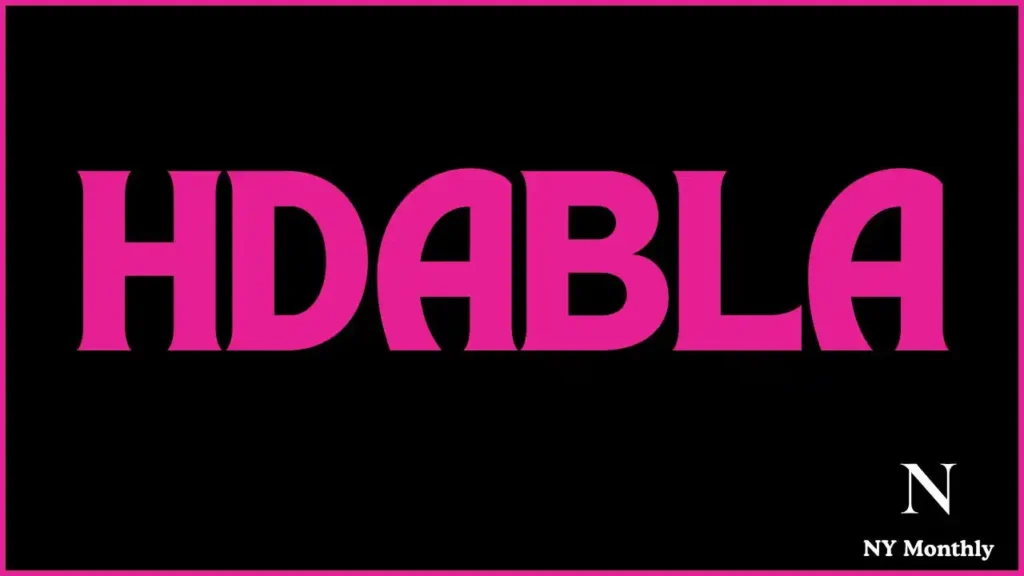In recent years, HDABLA has emerged as a groundbreaking innovation, reshaping the way industries operate and revolutionizing technological landscapes. With its unparalleled capabilities, HDABLA offers solutions that transcend traditional boundaries, driving efficiency and innovation. As businesses and individuals alike seek ways to enhance productivity and streamline operations, understanding HDABLA has become essential for staying ahead in today's competitive market.
HDABLA is not just another buzzword; it represents a shift in how technology is applied across various sectors. From enhancing data processing to improving user experiences, its applications are vast and versatile. This article aims to provide a comprehensive understanding of HDABLA, exploring its origins, functionalities, benefits, and potential future developments. Whether you're a tech enthusiast, a business owner, or simply curious about technological advancements, this guide will equip you with valuable insights.
As we delve deeper into the world of HDABLA, it's important to recognize its significance in shaping modern technology. By understanding its core principles and applications, you'll be better positioned to leverage its power for personal or professional growth. Let's explore what makes HDABLA a game-changer in the tech industry.
Read also:Bill Gatzimos Wikipedia The Ultimate Guide To His Life Achievements And Legacy
What Exactly is HDABLA?
HDABLA stands for High-Definition Adaptive Blockchain Ledger Architecture, a cutting-edge technology designed to enhance data management and security. At its core, HDABLA combines blockchain's decentralized nature with advanced data processing capabilities, offering a robust solution for managing complex information systems. Its adaptability allows it to integrate seamlessly with existing infrastructures while providing superior performance and reliability.
One of the key features of HDABLA is its ability to process vast amounts of data with unprecedented speed and accuracy. By leveraging blockchain technology, it ensures data integrity and transparency, making it an ideal choice for industries requiring secure and efficient data handling. Additionally, its adaptive nature enables it to evolve with changing technological landscapes, ensuring long-term viability and relevance.
Key Components of HDABLA
- Decentralized Network: HDABLA operates on a decentralized network, eliminating single points of failure and enhancing security.
- Advanced Algorithms: Utilizes sophisticated algorithms for data processing and analysis, improving efficiency and accuracy.
- Scalability: Designed to scale with increasing demands, ensuring consistent performance regardless of data volume.
How Does HDABLA Work?
To understand HDABLA's functionality, it's essential to break down its operational mechanism. HDABLA employs a multi-layered approach, combining blockchain's cryptographic techniques with advanced data processing algorithms. This integration allows it to handle complex data sets with ease while maintaining high levels of security and transparency.
When data enters the HDABLA system, it undergoes a series of verification processes to ensure its authenticity and integrity. Once verified, the data is stored in a distributed ledger, making it accessible to authorized users while safeguarding it from unauthorized access. This process not only enhances data security but also improves operational efficiency by streamlining data management.
Step-by-Step Process of HDABLA
- Data Entry: Data is entered into the system through various input channels.
- Verification: The system verifies the data's authenticity using cryptographic techniques.
- Storage: Verified data is stored in a distributed ledger, ensuring security and transparency.
- Access: Authorized users can access the data, with all transactions recorded for accountability.
The Benefits of HDABLA
Implementing HDABLA offers numerous advantages across various industries. Its ability to enhance data security, improve operational efficiency, and provide transparency makes it an attractive solution for businesses seeking to stay competitive in today's digital age. Let's explore some of the key benefits of HDABLA:
- Enhanced Security: HDABLA's decentralized nature and cryptographic techniques ensure data is protected from unauthorized access and cyber threats.
- Improved Efficiency: By automating data processing and management, HDABLA reduces the need for manual intervention, saving time and resources.
- Increased Transparency: All transactions recorded in the distributed ledger are visible to authorized users, promoting accountability and trust.
Applications of HDABLA Across Industries
HDABLA's versatility makes it applicable across a wide range of industries, each benefiting from its unique capabilities. From healthcare to finance, its applications are transforming how businesses operate and deliver value to their customers. Below are some industries leveraging HDABLA:
Read also:Jill Wagner Accident A Comprehensive Look At The Incident And Her Journey
Healthcare
In the healthcare sector, HDABLA is revolutionizing patient data management. By securely storing medical records in a distributed ledger, it ensures data is easily accessible to authorized healthcare providers while maintaining patient privacy. This not only improves patient care but also enhances operational efficiency within healthcare facilities.
Finance
Financial institutions are adopting HDABLA to enhance transaction security and reduce fraud. Its ability to verify and record transactions in real-time provides a transparent and secure environment for financial operations, instilling trust among clients and stakeholders.
Retail
Retailers are utilizing HDABLA to streamline supply chain management. By tracking product movements from manufacturing to delivery, businesses can ensure product authenticity and improve inventory management, ultimately enhancing customer satisfaction.
Challenges and Limitations of HDABLA
While HDABLA offers numerous benefits, it is not without its challenges. Implementing such a sophisticated technology requires significant investment in infrastructure and expertise. Additionally, regulatory hurdles and the need for standardization pose challenges that must be addressed for widespread adoption. Understanding these limitations is crucial for businesses considering HDABLA integration.
Overcoming Implementation Challenges
- Invest in Expertise: Hire skilled professionals to ensure proper implementation and maintenance.
- Partner with Technology Providers: Collaborate with experienced technology partners to navigate implementation challenges.
- Stay Updated with Regulations: Keep abreast of regulatory developments to ensure compliance and avoid potential legal issues.
Future Prospects of HDABLA
The future of HDABLA looks promising, with ongoing research and development aimed at enhancing its capabilities. As technology continues to evolve, HDABLA's adaptability ensures it remains relevant and effective in addressing emerging challenges. Experts predict increased adoption across industries, driven by its ability to deliver secure, efficient, and transparent solutions.
With advancements in artificial intelligence and machine learning, HDABLA's potential applications are expanding. These technologies, when integrated with HDABLA, could further enhance its data processing capabilities, opening new possibilities for innovation and growth.
Real-World Case Studies of HDABLA
To better understand HDABLA's impact, let's examine some real-world case studies where it has been successfully implemented:
Case Study 1: Healthcare Data Management
A major healthcare provider adopted HDABLA to manage patient data securely and efficiently. The implementation resulted in improved patient care, reduced administrative costs, and enhanced data security, setting a benchmark for the industry.
Case Study 2: Financial Transactions
A leading financial institution integrated HDABLA into its transaction system, significantly reducing fraud and enhancing customer trust. The transparency provided by HDABLA's distributed ledger ensured all transactions were recorded and verifiable, improving overall operational efficiency.
Expert Opinions on HDABLA
Experts in the tech industry have praised HDABLA for its innovative approach to data management and security. According to Dr. Emily Carter, a renowned blockchain expert, "HDABLA represents a significant advancement in how we handle complex data systems. Its ability to combine blockchain's security with advanced data processing makes it a powerful tool for modern businesses."
Industry analysts predict continued growth in HDABLA adoption, driven by its proven track record of delivering value across various sectors. As more businesses recognize its potential, the demand for HDABLA expertise is expected to rise, creating opportunities for professionals in the field.
Conclusion
In conclusion, HDABLA has established itself as a transformative technology, reshaping industries and driving innovation. Its ability to enhance data security, improve operational efficiency, and provide transparency makes it an invaluable asset for businesses seeking to stay competitive. By understanding its functionalities, applications, and potential challenges, you can make informed decisions about integrating HDABLA into your operations.
We invite you to share your thoughts and experiences with HDABLA in the comments section below. Your feedback is valuable in helping others understand the technology better. Additionally, explore our other articles to stay updated on the latest trends and developments in the tech industry.
Table of Contents
- What Exactly is HDABLA?
- How Does HDABLA Work?
- The Benefits of HDABLA
- Applications of HDABLA Across Industries
- Challenges and Limitations of HDABLA
- Future Prospects of HDABLA
- Real-World Case Studies of HDABLA
- Expert Opinions on HDABLA
- Conclusion


